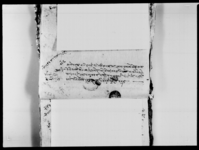A copy of a document informing the head priest of Matsyendranātha that he is being dispatched to Bhoṭa and cautioning other priests of the community not to interrupt the ritual worship of the deity (VS 1872)
ID: K_0630_0067
Edited and
translated by Manik Bajracharya and Rajendra Shakya
Created: 2022-10-25;
Last modified: 2023-08-07
For the metadata of the document, click here
The accompanying edition, translation/synopsis and/or commentary are available under the terms of the Creative Commons Attribution-ShareAlike 4.0 International License
Abstract
This document of which it is a copy, addressed to the main priest of the deity Matsyendranātha, informs him that he is being dispatched to Bhoṭa. It also instructs other priests in the community not to neglect the ritual worship of the deity while he is away.Diplomatic edition
[1r]
1पो१२व९पा११९मी७२२2१२२1पुजहारि1भं.नौहर्ष1हे.नौ.राम[seal with the legend: श्री टोपबाहादुर][seal with the legend: श्री टोपबाहादुर]1आगे∙नाय़क∙पानिजुलाई∙श्रीमछीन्द्रनाथ∙कापुजामापस्याकोरहेछ∙आज
2केहिकामले∙भोटपथाऊनुपर्योर∙भोलिवतीसवाडाभित्रकोमाकसैलेहरहे
3माइतगरी∙पुजामाकचवचपार्यो∙भन्यातसलाई∙भारी∙डंदसासना
4पर्ला∙ईतिसंवत१८७२साल∙पौषवडी१२⟪१२⟫रोज४सुभं¯¯¯¯ ¯¯¯¯¯¯
Translation
[1r]
Po. 12 va 9 pā 119 mī 7221
1222
The priest
bhaṃ. nau.3 Harṣa
he. nau.4 Rāma.
[seal with the legend: Śrī Ṭopa Bāhādura]
[seal with the legend: Śrī Ṭopa Bāhādura]
Āge: To the head pāniju [priest].
You have, I see, taken on the responsibility for ritual services to glorious Matsyendranātha (text: Machīndranātha). Today you need to be dispatched to Bhoṭa on some business. If anyone within the thirty-two bā̃ḍā (text: vāḍā) priests5 hinders the ritual services with prejudice, he will be subject to heavy punishments.
Wednesday, the 12th of the dark fortnight of Pauṣa in the [Vikrama] era year 1872 (1815 CE). Auspiciousness.
Commentary
This document, addressed to the head of the pāniju priests of [the deity] Matsyendranātha, informs the addresee that he is to be dispatched to Bhoṭa. It mentions neither the addresee's name nor the purpose of his mission. Regarding the place name Bhoṭa, it may, even though it is generally understood to mean Tibet, also refer to the northern areas in Nepal with a strong Tibetan cultural presence.6 The document further warns the remaining members of the community of 32 pānijus not to obstruct the ritual services to Matsyendranātha while the head is away.
Another microfilm of this document can be found under the identification number K_0015_0004B.

